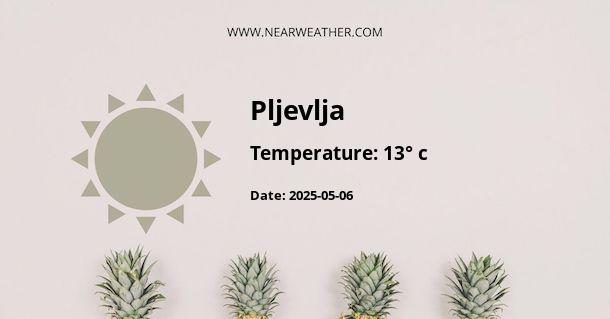Understanding the Climate and Weather Patterns of Opština Pljevlja, Montenegro
Opština Pljevlja, situated in the northern region of Montenegro, is an area characterized by a continental climate with certain variations due to its topography and elevation. In order to provide you with a comprehensive overview of the climate and weather patterns in Pljevlja throughout the year, let's delve into detailed seasonal analyses, temperature ranges, precipitation trends, and other climatic factors that shape life in this municipality.
Geographic and Climatic Overview
Pljevlja is nestled among the highlands of Montenegro, which plays a crucial role in its climate. The high elevation and the presence of surrounding mountain ranges modify the typical continental climate, creating microclimates within the municipality. These geographic features lead to variations in temperature and precipitation between different localities.
Seasonal Weather Characteristics
Winter
Winter in Pljevlja is characterized by cold temperatures and frequent snowfall. The season generally lasts from late November until early March. The average temperature during this period ranges from -5°C to 3°C (23°F to 37.4°F). Snow cover is often sustained throughout winter, and snowfall can be significant due to the moist air interacting with the colder continental winds.
| Month | Average High (°C/°F) | Average Low (°C/°F) | Precipitation (mm/in) |
|---|---|---|---|
| December | 2/35.6 | -3/26.6 | 85/3.3 |
| January | 1/33.8 | -5/23.0 | 75/2.9 |
| February | 3/37.4 | -3/26.6 | 70/2.7 |
Spring
Spring brings a notable increase in temperatures and a decrease in snowfall frequency. From March to May, the average temperatures rise from 5°C to 15°C (41°F to 59°F). This period also marks the gradual melting of snow, leading to higher river levels and occasionally resulting in spring floods.
- March: The transition between winter and spring, with temperatures ranging from -1°C to 9°C (30.2°F to 48.2°F).
- April: An increase in both temperatures and precipitation indicates the advent of spring.
- May: Warmer weather with frequent rain, setting the stage for lush greenery and blooming flora.
Summer
Summertime in Pljevlja is warm and moderately wet. It spans from June to August, with temperatures ranging from 14°C to 25°C (57.2°F to 77°F). Despite the increase in temperature, the town's elevation allows for cooler evenings, providing a comfortable climate for both locals and travelers.
- June: Pleasantly warm days signal the start of the tourist season and outdoor activities.
- July: The warmest month, ideal for exploring the natural beauty of the region.
- August: Similar to July but with a slight increase in precipitation as summer draws to an end.
Fall
As autumn approaches, a gradual decline in temperature is observed, with averages falling between 5°C and 15°C (41°F to 59°F). This season is known for its fluctuating weather patterns, varying from sunny and warm days to sudden cool spells. Precipitation is common, often leading to misty conditions, especially in the mornings.
- September: Declining temperatures but still pleasant and conducive for outdoor activities.
- October: Cooler weather starts setting in, accompanied by increased rainfall.
- November: The onset of the colder conditions, indicating the approach of winter.
Precipitation and Humidity Trends
In Opština Pljevlja, precipitation is relatively evenly distributed throughout the year, with a slight peak during the spring and fall months. The municipality experiences an annual average precipitation of around 800-1000 millimeters (31.5-39.4 inches). Humidity levels generally stay moderate because of the town's continental influence, providing a dry and comfortable atmosphere most of the year.
Wind Patterns and Effect on Climate
The winds in Pljevlja primarily include local mountain breezes and larger-scale continental airstreams. During winter, northerly winds can accentuate the cold sensation, while in summer, occasional gusty winds can arise due to temperature differences between the elevated terrain and valleys.
Impact of Climate on Local Life and Economy
The climate in Pljevlja significantly influences the local way of life and the economy. Agriculture remains a vital sector, with climate conditions being favorable for the cultivation of various crops, particularly potatoes, which thrive in cooler temperatures. Moreover, the weather patterns support a thriving timber industry and the development of eco-tourism through attractions such as the Tara River Canyon and Durmitor National Park. However, harsh winter conditions also necessitate sturdy infrastructure and heating solutions to cope with the colder months.
Forecasting and Weather Outlook
Due to the mountainous terrain and variable topography, weather forecasting in Pljevlja demands precise modeling and local expertise. Meteorologists pay close attention to regional patterns and historical data to provide accurate weather predictions essential for agriculture, tourism, and everyday life.
Climate Change Considerations
As with many other regions across the globe, Pljevlja is not immune to the impacts of climate change. Shifts in temperature and precipitation patterns could alter the traditional climate structure, affecting the local ecosystems, agriculture, and human activities. Monitoring trends and adaptation strategies are becoming increasingly important to address these potential changes.
In conclusion, Opština Pljevlja's continental climate, with its distinct seasonal shifts, offers a rich tapestry of weather patterns. This diverse climatic experience shapes the local culture, economy, and lifestyle, making it a unique area within Montenegro both for its residents and visitors alike.
A - Pljevlja's Latitude is 43.333328 & Longitude is 19.333330.
A - Weather in Pljevlja is 4° today.
A - Climate Conditions in Pljevlja shows overcast clouds today.
A - Humidity in Pljevlja is 76% today.
A - Wind speed in Pljevlja is 5.51 km/h, flowing at 211° wind direction. today.
